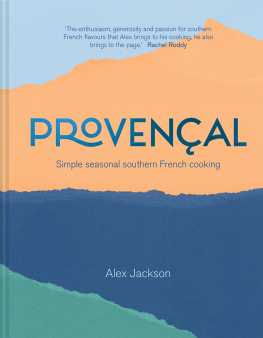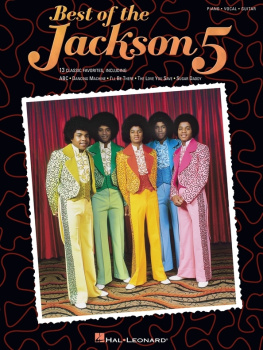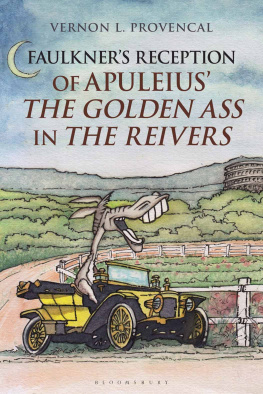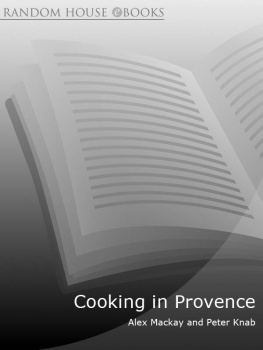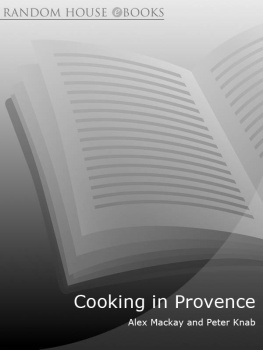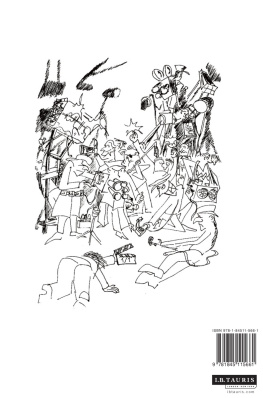Alex Jackson - Provencal
Here you can read online Alex Jackson - Provencal full text of the book (entire story) in english for free. Download pdf and epub, get meaning, cover and reviews about this ebook. year: 2022, publisher: HarperCollins Publishers, genre: Home and family. Description of the work, (preface) as well as reviews are available. Best literature library LitArk.com created for fans of good reading and offers a wide selection of genres:
Romance novel
Science fiction
Adventure
Detective
Science
History
Home and family
Prose
Art
Politics
Computer
Non-fiction
Religion
Business
Children
Humor
Choose a favorite category and find really read worthwhile books. Enjoy immersion in the world of imagination, feel the emotions of the characters or learn something new for yourself, make an fascinating discovery.
- Book:Provencal
- Author:
- Publisher:HarperCollins Publishers
- Genre:
- Year:2022
- Rating:4 / 5
- Favourites:Add to favourites
- Your mark:
- 80
- 1
- 2
- 3
- 4
- 5
Provencal: summary, description and annotation
We offer to read an annotation, description, summary or preface (depends on what the author of the book "Provencal" wrote himself). If you haven't found the necessary information about the book — write in the comments, we will try to find it.
Provencal — read online for free the complete book (whole text) full work
Below is the text of the book, divided by pages. System saving the place of the last page read, allows you to conveniently read the book "Provencal" online for free, without having to search again every time where you left off. Put a bookmark, and you can go to the page where you finished reading at any time.
Font size:
Interval:
Bookmark:
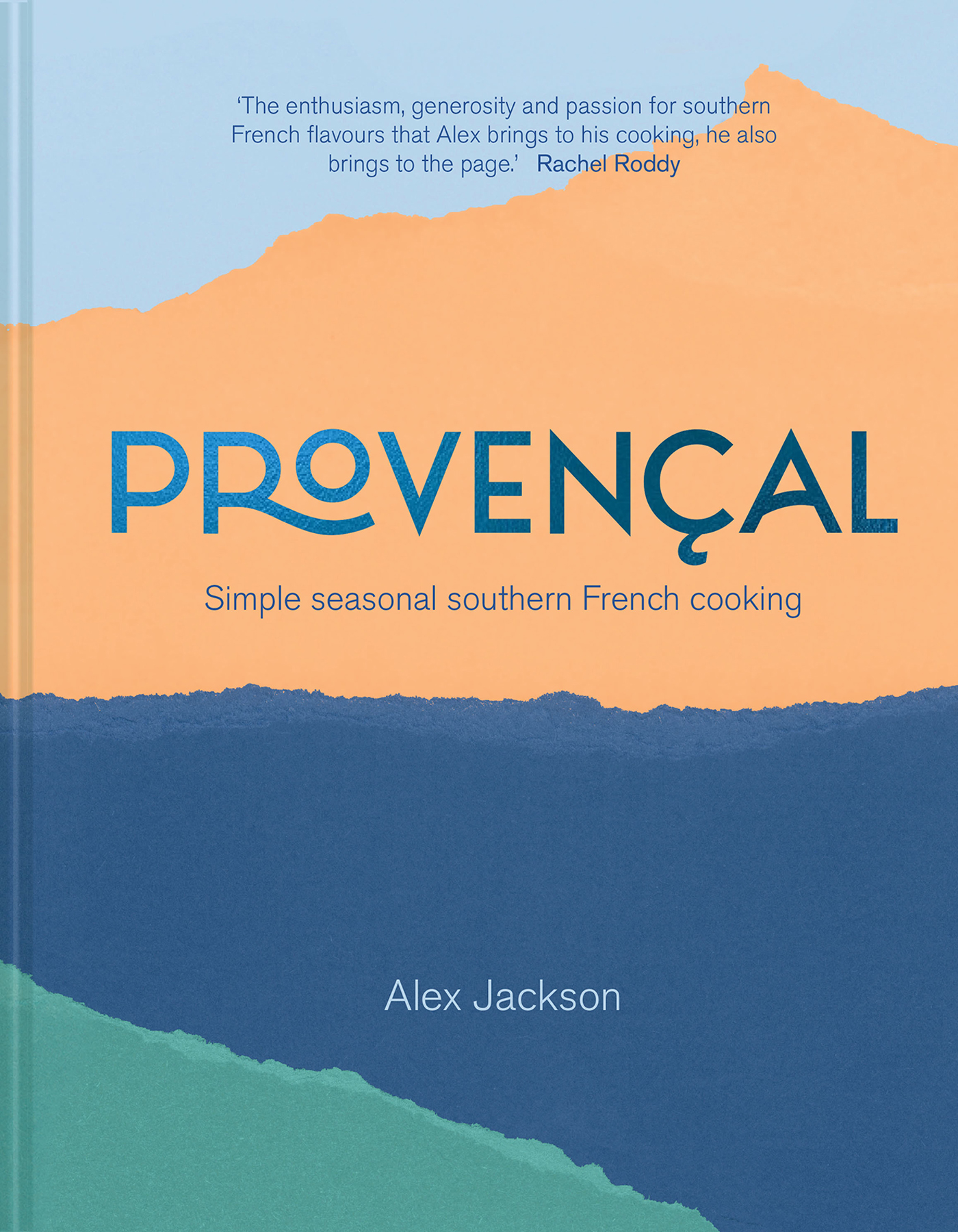


Pavilion
An imprint of HarperCollinsPublishers Ltd
1 London Bridge Street
London SE1 9GF
First published in Great Britain by Pavilion as Sardine, 2019
This new edition published by Pavilion, an imprint of HarperCollinsPublishers Ltd 2022
Text Copyright Alex Jackson 2022
Copyright HarperCollinsPublishers Ltd 2022
Alex Jackson asserts the moral right to be identified as the author of this work. A catalogue record for this book is available from the British Library.
Hardback ISBN: 9781911682721
eBook ISBN: 9780008606695
Version 2022-10-11
All rights reserved. No part of this publication may be reproduced, stored in a retrieval system, or transmitted, in any form or by any means, electronic, mechanical, photocopying, recording or otherwise, without the prior permission of the publishers.
WHEN USING KITCHEN APPLIANCES PLEASE ALWAYS FOLLOW THE MANUFACTURERS INSTRUCTIONS
This ebook contains the following accessibility features which, if supported by your device, can be accessed via your ereader/accessibility settings:
- Change of font size and line height
- Change of background and font colours
- Change of font
- Change justification
- Text to speech
- Page numbers taken from the following print edition: ISBN 9781911682721
When we opened my now-closed restaurant Sardine in Summer 2016, we thought we had spied a gap in the market. Southern French cooking seemed underrepresented in London, and we wanted to open a little neighbourhood restaurant to cook simple, homely food from Provence and Languedoc. We were lucky to have had many kind words said about us, but one comment seemed to stick: that eating at Sardine was like meeting with an old friend, that you hadnt realised you missed as much as you did. I was too young to remember the first Provenal love-in, and was oblivious, at first, to the fact that the old friend had been forgotten.
Provenal food was, for a while, most fashionable. Peter Mayles A Year in Provence, published in 1989, sold a million copies in the UK alone, and brought a largely unknown region to the attention of hordes of red-trousered Englishmen keen to experience its rustic charms. Thus, in the era of the 90s dinner party, Provenal food was suddenly the thing pissaladire, stuffed vegetables, salad nioise, ratatouille, everything with herbes de Provence. All classics, obviously, but all done to death in a thousand botched efforts to impress. Eventually, inevitably, these dishes lost their lustre. The public ended their love affair with Provence and looked to other, more attractive climes.
The publication of a certain River Caf Cook Book in 1995 coincided with, or perhaps began, our obsession with regional Italian cuisine. Simplicity, authenticity and attention to detail were the tenets to live buy, and above all, the important thing was the quality and provenance of ingredients: a bottle of new seasons extra virgin olive oil, a tin of salted anchovies, proper dried porcini, a tomato that tastes of something. And rightly so! But what we seem to have forgotten is that the food of Provence is, and always has been, very closely linked to the rustic cooking of rural Italy and Spain: one mans soupe au pistou is anothers minestrone con pesto; a Sardinians bottarga is the poutarge from Camargue; the famous Ligurian farinata is the proud Niois socca; and, anyway, just how different, really, is alioli from aoli?
Provence and Languedoc are Frances window onto the Mediterranean Sea and all that lies beyond, and the culinary influences that converge there make for a cuisine that is varied, rich and deep. These regions seem, to me at least, to stand apart from the rest of French cuisine. There is something altogether lighter, more exotic and, dare I say it, more Italian about the whole thing. In Lyon, the gastronomic capital of France, some 300km north of the Provenal coast, butter remains the cooking fat of choice. Further into the southwest, its the land of duck fat, but in Provence and Languedoc, theres olive oil. The Greeks brought the olive tree to Provence 8,000 years ago, and the olivier is perhaps the thing that anchors the region to the rest of the Mediterranean, with olive oil remaining the basis, and sometimes the focus, of its cooking.
My interest in the cooking of the South of France started a long time ago. Im from the distinctly unglamorous city of Birmingham not considered one of the great food cities of the world but luckily this was the era of the Nineties dinner party, and my mum had a formidable cookbook collection. For us kids it was also the era of the summer holiday to the South of France the Tarn region of the Languedoc, to be specific and the start of an appreciation of that part of the world that has stayed with me. I remember our morning trips to the village boulangerie, and what was, to a British sensibility, an almost intoxicating smell of a hundred baguettes fresh out of the oven. Id be made to order the bread in nervous French, and I suppose those were the first steps to studying French at university later on in life. There was that childrens (and, admit it, adults) favourite of steak hach, pink in the middle, and a now-mythical roadside van on some forgotten D-road, serving an absolutely blinding steak, chips and mustard on a paper plate, which we ate at a plastic table next to the car.
As part of my French degree at university, already a keen cook, I moved to Paris for a year ostensibly to study, but realistically to drink rough red wine and try to chat up French girls. Our daily ritual was to decamp to the cheapest caf, find a decent outward-facing table, order a coffee and watch the people go by with their shopping. In the Maison de Jambon, as it was called, hung legs of Parmas finest, and in the winter, a huge sign on the window: LES TRUFFES BLANCHES DITALIE SONT ARRIVES. We didnt have a lot of money for white truffles, but once a week wed go to the market on the Avenue de Saxe, with the Eiffel Tower looming high at the end of the street, and walk up and down inspecting the produce. A whole rabbit, maybe, because wed never made Lapin la Moutarde, to be cooked in a tiny electric oven that hung off the wall. A big bunch of spinach to go with some gnocchi, blue cheese and walnuts, eaten on a freezing cold night. Some baby squid and fennel for a plate of orecchiette with breadcrumbs and herbs. Oysters and champagne to celebrate some small victory or other. A ripe, raw milk Camembert, to stick with garlic, souse with white wine and bake, gloriously drunk, in the oven. With the occasional casual meal out inevitably at a restaurant with a tiny, one-man, everything-within-reach kitchen, chequered tablecloths and a free Kir while you wait; followed by cold prawns and mayonnaise, gsiers en salade, duck confit with lentils, and a bottle of house red it struck us how easy it was to eat very well for very little money, and we were determined to profit from it.
In retrospect, living in Paris for that year in my early twenties served as an introduction to what simple French food really was, and soon enough I got the opportunity to do some of the French country cooking I had read about. I vowed to live in Paris again, but never did. Instead, I returned to London and fell into my first restaurant job at Stevie Parles Dock Kitchen. Stevie, its fair to say, took a punt on someone with bags of enthusiasm but absolutely no experience, and was willing to put up with a split mayonnaise or two. At the start, there was only one cook, and he used to turn up late every day and write a menu on the spot. I used to set up the restaurant in record time so there was time to get involved in some cooking, and soon came to realise that I should give the chef thing a shot.
Font size:
Interval:
Bookmark:
Similar books «Provencal»
Look at similar books to Provencal. We have selected literature similar in name and meaning in the hope of providing readers with more options to find new, interesting, not yet read works.
Discussion, reviews of the book Provencal and just readers' own opinions. Leave your comments, write what you think about the work, its meaning or the main characters. Specify what exactly you liked and what you didn't like, and why you think so.

